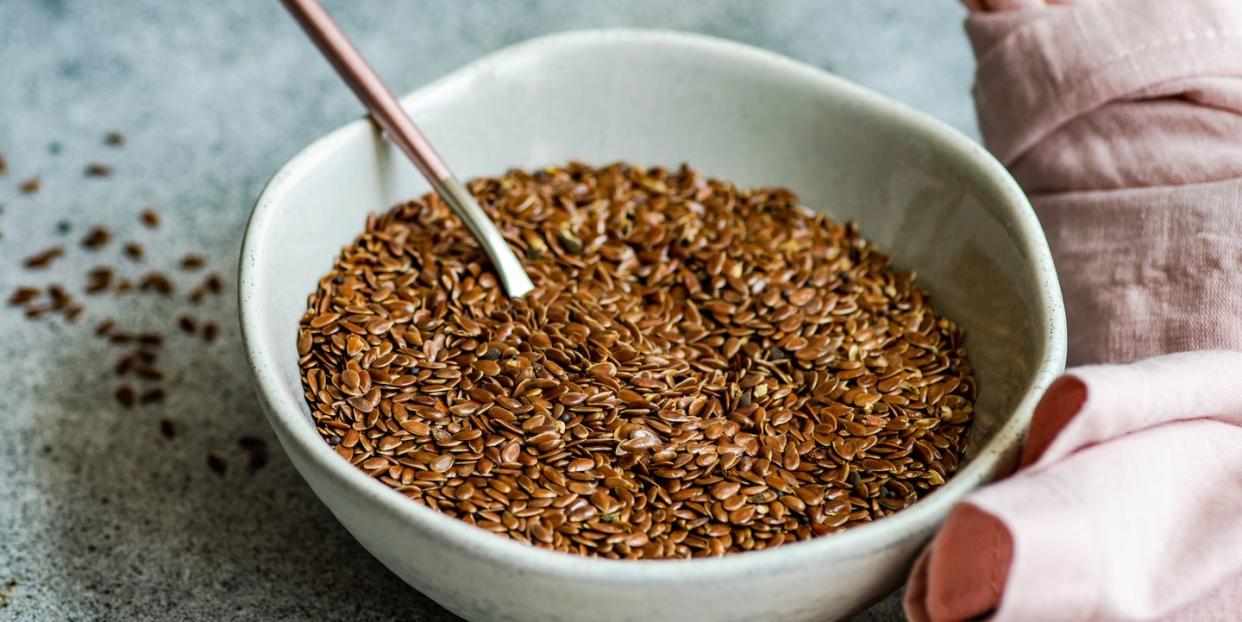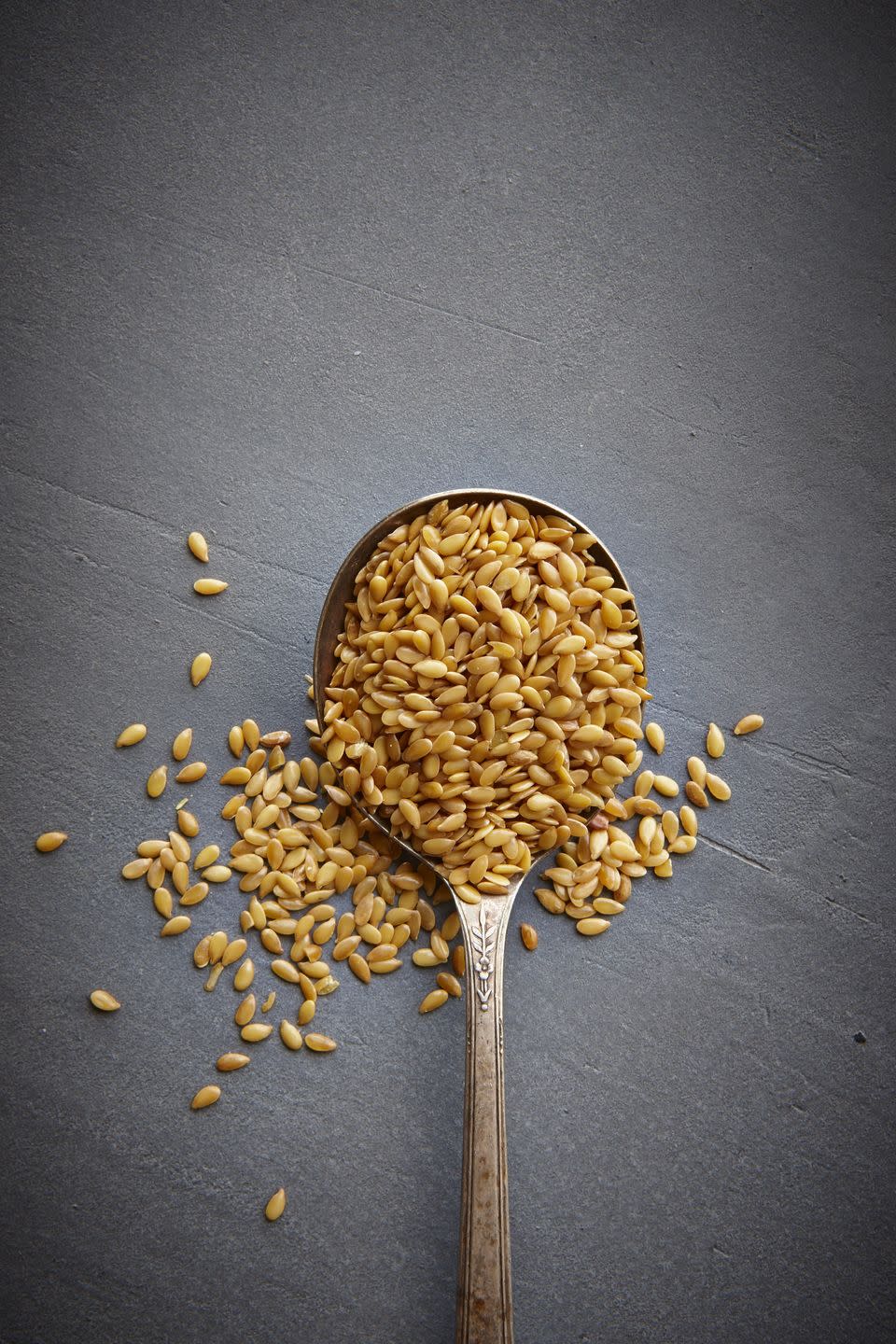Flaxseed is the fibre-filled satiation saviour you need to know about

While flaxseed might not be the sexiest foodstuff, it’s certainly got some serious nutrition creds. Countless experts, including the late Michael Mosley who pioneered the 5:2 and Fast 800 diets, have endorsed the powerhouse seed for its fibre content and other benefits.
But what actually is flaxseed? And how exactly is it good for you? Our lowdown has got you covered.
What is flaxseed?
At the most basic level, flaxseed is a food and fibre crop that comes in the form of seeds or flaxseed oil. The seeds have different nutritional benefits to the oil, so it’s worth checking out which form is best for you. For example, the fibre in flaxseed is found in the skins of the seeds, so consuming flaxseed oil would not add any extra fibre to your diet.
Flaxseeds are one of the world’s oldest crops and come in two varieties: brown and golden. Both are equally as nutritious, and one serving (1 tablespoon or 7g) contains fibre, protein, omega-3 fatty acids and vitamins. Flaxseed is also particularly high in thiamine, which is a B vitamin that plays a key role in energy metabolism and cell function, supporting a healthy heart, brain and nervous system.
The seeds are crunchy in texture and mildly nutty in flavour, making them great for sprinkling over salads or even blitzing into smoothies.
How is flaxseed different to linseed?
Confusingly, linseed and flaxseed are exactly the same thing. Here in the UK, flaxseed and linseed are used to refer to the fibrous little seeds interchangeably, whereas in the US they’re usually referred to exclusively as flax.

Flaxseed benefits
1. They’re high in fibre
One of the main benefits of adding flaxseed to your diet is an increase in dietary fibre. Fibre has been a bit of a buzzword this year, and for good reason. A diet high in fibre has been shown to support gut health and improve bowel regularity.
Marilia Chamon, registered nutritionist and founder of Gutfulness Nutrition, says: ‘Flaxseeds are high in both soluble and insoluble fibre, which supports gut health.
‘Soluble fibre can help regulate blood sugar levels and lower cholesterol, while insoluble fibre aids in bowel regularity and prevents constipation,’ she says.
Essentially, soluble fibre absorbs water in the intestine and slows down digestion, which is what may help regulate blood sugar levels and lower cholesterol. Insoluble fibre helps prevent constipation by adding bulk to your poo, according to research.
2. Lower cholesterol
The benefits of flaxseed aren’t just limited to increasing levels of dietary fibre. Flaxseeds contain alpha-linolenic acid (ALA), a type of omega-3 fatty acid that studies say is important for heart health. In fact, ALA is one of the two fatty acids that the body doesn’t make naturally, so it needs to be obtained through food.
According to research studies, ALA may prevent cholesterol from being deposited in your heart’s blood vessels (essentially how much cholesterol your body absorbs from food), lowering overall cholesterol as low-density lipoproteins (‘bad’ cholesterol).
Consuming flaxseeds has also been associated with other elements of improved health like a lower risk of heart disease, type 2 diabetes and stroke.
Michaella Mazzoni, a Cambridge-based registered nutritionist specialising in female health, chronic pain and autoimmune diseases agrees, saying: 'The omega three fatty acids found in flaxseeds are supportive of brain health, cholesterol, hormonal health and energy production.'
3. Lower risk of cancer
There is also evidence to suggest that eating flaxseed may help to protect against certain kinds of cancers. This is due to flaxseed's lignan content. Lignans are polyphenols found in plants that have been studied for their cancer-fighting properties, and studies show that flaxseed has 75-800 more lignans than any other food.
While more research is needed, consuming lignans in flaxseed has been associated with a lower risk of developing breast cancer, especially in post-menopausal women.
Chamon says that lignans may also aid hormone balancing for women, as they are oestrogen-like in structure. So if you’re trying to follow and hormone-balancing diet, flaxseeds may be worth considering.
Mazzoni agrees, saying: ‘Clinically, I often recommend that my clients with endometriosis, fibroids, perimenopause, PCOS and PMDD have flaxseeds every day.’
However, if you have a history of oestrogen-dependent cancer in your family, you might want to seek advice from your GP before adding a significant amount of flaxseed to your diet, says Mazzoni. ‘People who should be careful with eating a lot of fresh ground flaxseeds are those who have oestrogen-dependent cancer in their personal history,’ she says. This is because of the flaxseed’s oestrogen-like structure.
4. Lower blood pressure
If you’re trying to lower your blood pressure, adding flaxseeds to your diet might be a great way to help.
A study of people with high blood pressure showed that eating 4 tablespoons of milled flaxseed per day led to a reduction in blood pressure, cholesterol and even BMI.
Likewise, a review of 15 studies found that supplementing your diet with flaxseed may lower levels of systolic and diastolic blood pressure.
5. Blood sugar control
The benefits of this super seed don’t stop there. Some studies show that flaxseed may even be responsible for better blood sugar control.
A review of over 20 studies found that eating whole flaxseed (note - not milled) may decrease blood sugar and prevent insulin resistance. The study said that this, in part, may be due to the all-important fibre content of the seed. Research shows that soluble fibre slows the absorption of sugar in the blood, which may reduce blood sugar levels overall.
6. Weight management
While nothing should be a quick fix or cure-all for weight management, there is some evidence to suggest that supplementing your diet with flaxseed might result in a reduction in BMI and body weight.
Chamon says this also may be in part due to the feeling of satiation gained through increasing your fibre intake. ‘Due to their high fibre content, flaxseeds can promote a feeling of fullness and help control appetite,’ she says.
Are there any risks associated with eating flaxseed?
While adding flaxseed to your diet is pretty low-risk, there are some things to be aware of before taking the plunge.
‘For some individuals, consuming large amounts of flaxseeds can cause bloating, gas, and diarrhoea due to their high fibre content,’ says Chamon.
Another thing to note is that if you're pregnant or breastfeeding you should probably check with your GP before adding flaxseed into your diet, as some of the compounds in flaxseed can mimic the effects of oestrogen, according to research.
Mazzoni points out that although flaxseeds are easy to incorporate into your diet, they can be a little high maintenance. ‘The omega three fatty acids and phytoestrogens start to degrade after about 15 minutes from being ground up,’ she says. ‘So if you were buying pre-ground flaxseeds, mostly you’re just going to get the fibre which is fine if you’re only using them in your diet for that reason, but if you’re trying to include flaxseeds to support your hormones or any of the other areas I mentioned above, then it is better to buy whole flaxseeds.’

How much flaxseed should you eat per day?
Chamon says that while the ideal amount of flaxseeds for each person varies based on individual dietary needs, 1-2 tablespoons is normal.
She says that ground flaxseed may be easier to digest than whole, which is a good move if you've never tried the fibre-filled seeds before.
‘If you are new to flaxseeds, it's best to start with a smaller amount (for example 1 teaspoon) and gradually increase the quantity to allow your digestive system to adjust,} says Chamon.
Don’t forget to drink plenty of water to aid any digestive discomfort, and store your seeds in the fridge to prevent the fats and oils from turning rancid.
How to eat flaxseed
There are so many tasty ways to incorporate flaxseed into your diet. Here are a few easy ways to increase your flaxseed intake:
Blitz into your favourite smoothie
Sprinkle over salads for a little extra crunch
Add into bakes like muffins, cookies or even homemade bread
Make an egg substitute using flaxseed and a little water
Mix into burgers or meatballs
More in Nutrition
‘I tracked my glucose levels for a month, and this is what I found out'
The egg diet is going viral, but it isn’t the health fix you might think it is
The Fast 800 diet was one of Michael Mosley’s most famous diets – but does it work?
Cut through the noise and get practical, expert advice, home workouts, easy nutrition and more direct to your inbox. Sign up to the WOMEN'S HEALTH NEWSLETTER
You Might Also Like


